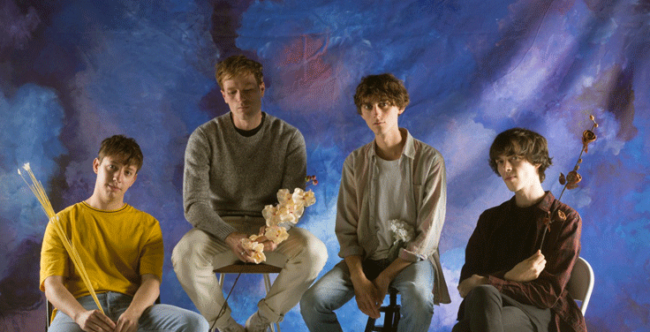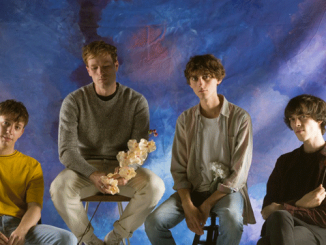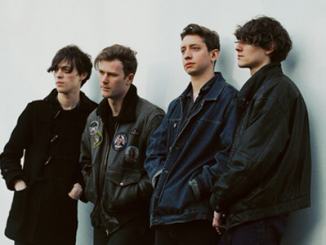Following the release of their 2015 debut album, A Dream Outside, London indie rockers Gengahr are back with their second studio album, Where Wildness Grows. The band scrapped their initial effort at that clichéd “difficult second album,” as they began to fall down the recording rabbit hole of perfectionism. After throwing that first attempt in the trash (taking a financial hit and wasting months in the studio in the process), they recorded Where Wildness Grows in just two weeks with a conscious focus on recording live in a room together.
Where Wildness Grows opens with the bright, gleaming earworm of a guitar riff on Before Sunrise and already you know that you’re in for indie-rock brilliance. The breezy yet dark indie tune features frontman Felix Bushe delivering a poetic ode to nighttime with his Methyl Ethel-esque, falsetto vocals.
Next is Mallory with Bushe’s commanding but still comforting lead vocals, prowling amid a haze of chaotic, psych-rock guitars and a mix of plug and chug and melodic keyboards. Is This How You Love? features the best intro on the album with an almost EDM-sounding, muffled fade in of percussion, distorted guitars and futuristic keyboards. The result is a funky, slick psych-pop tune with a more keyboard-driven focus and what’s so satisfying about the track is their guitar work is arguably interesting enough to take centre stage if the band chose to do so.
I’ll Be Waiting completes the incredibly solid four-track opening to the record with some of the best vocals on the album, though it opts for a more standard indie-pop sound with the obligatory vocal “ooh ooh ooh’s” and dream-pop guitars. The track also serves as necessary breathing room after the intensely dense yet absorbing instrumentation on the first three tracks.
The title track comes next and surprisingly, there’s no distortion on the intro guitars, which marks another shift in the sound (though distorted guitars will certainly make an appearance later in the track with mind-bending results). In this vulnerable track, Bushe ponders the motivation that gets people out of bed every day and he questions whether one should lose hope when passions don’t go to plan. Though the song has a memorable chorus, it lulls a bit (perhaps due to length), but only compared to the impressive four tracks that open the record.
Chaotic guitars return for the intro of Blind Truth, though even their masterful guitars and beautiful vocals can’t redeem this slow, throwaway track. Lucky for them (and us listeners), the remaining half of the album doesn’t miss a beat. At first, Carrion sounds like a song from a classic horror/thriller film, but after the dark, dramatic build, we get an enlivening (but still sinister) record with enthralling, charismatic vocals and the strongest guitar solo on the album.
Burning Air, according to Bushe, is “a song that screams for integrity,” another sign that the band are interested in making relevant records for the modern age (not just happy-go-lucky love songs) while maintaining a level of sarcasm to ensure they aren’t taking themselves too seriously. The song features captivating, stop-start guitars, which are impossible to resist nodding or headbanging along to.
Left In Space, as the title references, is a return to atmospheric, space-age guitars and keyboards. One of the best moments on the album is this song’s swirling guitar and keyboard outro with Bushe’s lush, echoing “ooh ooh ooh’s.” Pull Over Now features electronic drums, pulsing keyboards and one of the most unusual guitar tones thus far, rivalling the earworm quality of the guitars on the album’s lead track.
Rising Tides feels rather bare with just minimal instrumentation and Bushe’s vocals at the forefront, risking the interest of listeners who may have enjoyed the large dense quality of the album so far, but wah-wah guitars arrive just in time to maintain the track’s intrigue. They definitely secure their footing in the end with stunningly gorgeous vocal melodies (“Maybe you were right”), charming guitars and a serene instrumental fade out. The opening of the final track, Whole Again, is rather noisy and jarring compared to the previous track, but the initial wave of sound eventually subsides for an endearing end to the album, but not without one last compelling guitar solo.
Where Wildness Grows is a genre-spanning tapestry of psych, indie-rock, dream-pop, and synth-pop sprinkled with dark undertones and moments of naivety and vulnerability necessary for the times. Gengahr has joined the ranks of bands that are redefining what it means to be an indie band in 2018. Their album is the much-needed antithesis of predictable and inoffensive “landfill indie” due to its concrete, timely lyrical themes, musical diversity, attention to sonic details, songwriting craftsmanship and jaw-dropping performances. Intentionally or not, the band often blurs the line between keyboards and guitars, leaving listeners struggling to decipher the magic they just heard: definite proof that the band is testing their recording and songwriting limits.
The album is full of strong vocal melodies with the use of Bushe’s smooth falsetto, which are nicely offset by the sheer chaos and noise provided by their warped guitars (albeit just as carefully constructed as Bushe’s vocals). Though keyboards are arguably just as crucial to the overall sound of the album, their guitars are what really set this band apart and their use never feels self-indulgent or monotonous. They’re able to keep you hooked due to their clown car of guitar tones and the band truly excels at progressively adding layers to their songs without overwhelming listeners.
Though Gengahr probably won’t be selling out stadiums or topping the charts anytime soon, Where Wildness Grows is likely one of the best indie-rock records you’ll hear this year. It’s a joyous follow-up record from a criminally overlooked band.





Be the first to comment